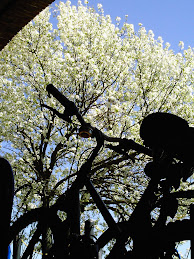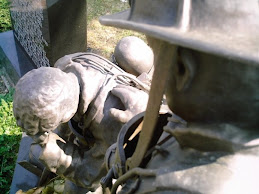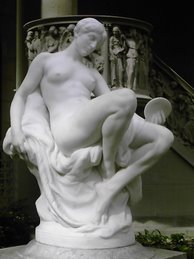By Joseph Kellard
Last week, BusinessWeek featured a good cover story on an executive of an Aspen ski resort, Auden Schendler, who has long championed corporate environmentalism, but has since become disillusioned—at least to the extent that it is cost effective for his company.
http://tinyurl.com/393kas
The article is encouraging only in that it features, amidst a time when American businesses are frantically scrambling to bill themselves as "environmentally friendly," a businessman openly challenging the faith that environmentalism and capitalism are compatible, particularly as a means to combat so-called "climate change."
Here are some excerpts:
"'Who are we kidding?' [Schendler] says, finally. Despite all his exertions, the resort's greenhouse-gas emissions continue to creep up year after year. More vacationers mean larger lodgings burning more power. Warmer winters require tons of additional artificial snow, another energy drain. 'I've succeeded in doing a lot of sexy projects yet utterly failed in what I set out to do,' Schendler says. 'How do you really green your company? It's almost f------ impossible.'"
"For all his hard work, however, Schendler began to feel a creeping disappointment. Combined, the hydro and solar projects eventually will generate less than 1% of the company's power needs."
"Schendler explains his confessional mood as the result of cumulative frustration: with foot-dragging colleagues, with himself for compromising, and with the entire green movement frothily sweeping through corporations in America and Europe."
As Objectivists have unfortunately come to expect in today's polluted philosophical environment, the problem is that even businessmen such as Schendler fail to see that the problem is with environmentalism as such, and so he never questions the green movement's roots, nor discovers how its is fundamentally opposed to capitalism. That, apparently, is asking too much of an executive who studied environmental science in college and considers himself a "nature-lover," which to many equates to being an environmentalist.
As a solution, predictably and tragically, Schendler is calling for his company to "favor more meaningful green projects," and more governmental regulation of carbon emissions.
Of course, what Schendler needs is a good lecturing. Perhaps he can begin with Richard Salsman's "Corporate Environmentalism and Other Suicidal Tendencies":
http://tinyurl.com/33zdkg
Please post a comment about this column. For private comments, email Joseph Kellard at Theainet1@optonline.net.
Copyright © 2007 Joseph Kellard
Wednesday, October 31, 2007
How Atheism Can Lead to Religiosity
By Joseph Kellard
A Boston Globe feature article on the growing number of "non-believers" in the United States-well, at least among our youth-actually gives a glimpse into why many Americans are instead finding God.
http://tinyurl.com/2mhzfk
Both the non-believers highlighted in this article and its author, as illustrated by his reporting, show why assorted non-believers (atheists, agnostics, humanists, secularists, etc.) cannot unite around their *non*-belief and "free thought."
Atheism, of course, is not a philosophical system. Philosophically, it is simply a rejection of God on metaphysical grounds (although, I realize, some atheists are such on emotionalist grounds), which leaves wide open what non-believers believe in otherwise-thus, atheists run the gamut from Objectivists to nihilistic-anarchists (the emotionalist type).
What's noteworthy is that the article describes today's humanists as having roots in such non-believers as Hume, Marx, Nietzche and even Ayn Rand-but "align themselves with more recent proponents of ridding society of God," including Richard Dawkins, Carl Sagan and Kurt Vonnegut. Of course, the problem here lies in lumping Ayn Rand in with the likes of Marx, implying she is a passé atheistic forbearer rather than the still under-recognized philosophical innovator that she is.
Also note that among the young non-believers that the author quotes, most make appeals to "science" while saying nothing about moral values and where they derive them rather than from God.
"I oppose any ideology that motivates people to ignore or deny scientific evidence, especially when that evidence is crucial for improving people's lives," says the president of the Tufts Freethought Society.
The author does explore the moral values of one non-believer, Greg Epstein, the focus of his piece, who wants his ilk to go beyond denouncing religion, and denying the existence of God, so that they can focus on what unites them. So what unites them? Well, when Epstein defines humanism, he calls it a "philosophy of life without supernaturalism that affirms our ability and responsibility to lead ethical lives of personal fulfillment aspiring to the greater good of humanity."
Further, Esptein finds this maxim inspiring: "Working to benefit society maximizes individual happiness."
After reading the article, I concluded that within a decade or less, Epstein will likely be preaching socialism somewhere, perhaps at a religious congregation. I can hear it now: "Workers of the world unite…"
Please post a comment about this column. For private comments, email Joseph Kellard at Theainet1@optonline.net.
Copyright © 2007 Joseph Kellard
A Boston Globe feature article on the growing number of "non-believers" in the United States-well, at least among our youth-actually gives a glimpse into why many Americans are instead finding God.
http://tinyurl.com/2mhzfk
Both the non-believers highlighted in this article and its author, as illustrated by his reporting, show why assorted non-believers (atheists, agnostics, humanists, secularists, etc.) cannot unite around their *non*-belief and "free thought."
Atheism, of course, is not a philosophical system. Philosophically, it is simply a rejection of God on metaphysical grounds (although, I realize, some atheists are such on emotionalist grounds), which leaves wide open what non-believers believe in otherwise-thus, atheists run the gamut from Objectivists to nihilistic-anarchists (the emotionalist type).
What's noteworthy is that the article describes today's humanists as having roots in such non-believers as Hume, Marx, Nietzche and even Ayn Rand-but "align themselves with more recent proponents of ridding society of God," including Richard Dawkins, Carl Sagan and Kurt Vonnegut. Of course, the problem here lies in lumping Ayn Rand in with the likes of Marx, implying she is a passé atheistic forbearer rather than the still under-recognized philosophical innovator that she is.
Also note that among the young non-believers that the author quotes, most make appeals to "science" while saying nothing about moral values and where they derive them rather than from God.
"I oppose any ideology that motivates people to ignore or deny scientific evidence, especially when that evidence is crucial for improving people's lives," says the president of the Tufts Freethought Society.
The author does explore the moral values of one non-believer, Greg Epstein, the focus of his piece, who wants his ilk to go beyond denouncing religion, and denying the existence of God, so that they can focus on what unites them. So what unites them? Well, when Epstein defines humanism, he calls it a "philosophy of life without supernaturalism that affirms our ability and responsibility to lead ethical lives of personal fulfillment aspiring to the greater good of humanity."
Further, Esptein finds this maxim inspiring: "Working to benefit society maximizes individual happiness."
After reading the article, I concluded that within a decade or less, Epstein will likely be preaching socialism somewhere, perhaps at a religious congregation. I can hear it now: "Workers of the world unite…"
Please post a comment about this column. For private comments, email Joseph Kellard at Theainet1@optonline.net.
Copyright © 2007 Joseph Kellard
Sunday, October 28, 2007
Ayn Rand Lexicon Online
By Joseph Kellard
The Ayn Rand Institute received permission to post the entire "Ayn Rand Lexicon" on its web site:
www.aynrandlexicon.com
I'm anticipating that the lexicon's editor, Harry Binswanger, will be writing about this development on his Harry Binswanger List.
The Ayn Rand Institute received permission to post the entire "Ayn Rand Lexicon" on its web site:
www.aynrandlexicon.com
I'm anticipating that the lexicon's editor, Harry Binswanger, will be writing about this development on his Harry Binswanger List.
Thursday, October 25, 2007
Gus is Staying; I Get a Little Personal
By Joseph Kellard
Gus Van Horn, my favorite Objectivist blogger, writes a post celebrating the third anniversary of this blog. In this post, he reflects on the pros and cons of writing for his blog, and, at first, it appears as if he’s considering calling it quits. Thankfully, that’s not the case. To my delight, Gus has decided to continue blogging, and below you’ll find my response to Gus’s post. I thought it would make for interesting reading for you, my readers.
Gus,
I'm happy that you've decided to continue blogging. For various reasons, I've stopped subscribing to TIA Daily, and so I've turned to reading various Objectivist blogs instead. Your blog is one of a handful that I try to read every day.
As a writer by profession, I can certainly sympathize with your pausing to weigh the pros and cons of blogging, and whether it’s worth it to continue. I’ve been writing opinion pieces for more than a decade now. In the early days, after starting and writing a quarterly newsletter for about a year and a half, I tried to write a weekly opinion column or essay for what became a weekly email newsletter. For the most part, I succeeded.
But once I changed professions and became a full-time journalist, however, things really changed. I found that, after sitting at a computer writing all day, coming home and starring at a computer to write even more eventually took a heavy toll on me. For a few years, I tried writing a periodic column for the newspaper where I work, but, as you wrote in your post, most people at work, namely my publishers and boss, did not necessarily want to hear what I had to say. My left-wing publishers, and my pragmatic, conservative boss, put the clamps on my column writing, particularly after I wrote one reluctantly calling on readers to support Bush over Kerry in 2004.
On top of all this, I’ve never been able to successfully reconcile my writing with two other important values: a social life and romance. At 41, I’m still single, and now more than ever I’m looking for my true love. For many years I loved reading, studying and writing so much, that I just put these values aside, or, to be more accurate, I pursued them much less aggressively that I should have. Both writing and finding friends and a girlfriend have never come easy to me. I’m basically introverted, and so talking to the ladies has not been my forte. But if, as a man, you want to meet a woman, then you’d better lean how to get over your insecurities and find the courage to open your mouth. So I constantly had (and have) this tug-of-war going on between my love of writing/reading and my love of women. I’ve found that, because it’s largely in my control, a writing career has come relatively easy; but finding the right woman has proven much more difficult.
Anyway, until I meet the love of my life, and assuming she and I are compatible and we marry, and until I get that well-paying journalistic job (almost an oxymoron) that will make me much more financially secure than I am, I don’t see myself putting in the time, effort and energy that I once did to produce ever-improved opinion columns and essays—my true love.
In the meantime, I do what I can, here and there, to pump out an occasional HBL post, opinion piece, letter to the editor, and blog post, and maybe I’ll read David Allen’s book and find it as fruitful as you have. Also, I’m happy to see that you, too, are trying to work through your own individual “issues” with your writing, and that you will continue to blog.
Keep up the great work.
Gus Van Horn, my favorite Objectivist blogger, writes a post celebrating the third anniversary of this blog. In this post, he reflects on the pros and cons of writing for his blog, and, at first, it appears as if he’s considering calling it quits. Thankfully, that’s not the case. To my delight, Gus has decided to continue blogging, and below you’ll find my response to Gus’s post. I thought it would make for interesting reading for you, my readers.
Gus,
I'm happy that you've decided to continue blogging. For various reasons, I've stopped subscribing to TIA Daily, and so I've turned to reading various Objectivist blogs instead. Your blog is one of a handful that I try to read every day.
As a writer by profession, I can certainly sympathize with your pausing to weigh the pros and cons of blogging, and whether it’s worth it to continue. I’ve been writing opinion pieces for more than a decade now. In the early days, after starting and writing a quarterly newsletter for about a year and a half, I tried to write a weekly opinion column or essay for what became a weekly email newsletter. For the most part, I succeeded.
But once I changed professions and became a full-time journalist, however, things really changed. I found that, after sitting at a computer writing all day, coming home and starring at a computer to write even more eventually took a heavy toll on me. For a few years, I tried writing a periodic column for the newspaper where I work, but, as you wrote in your post, most people at work, namely my publishers and boss, did not necessarily want to hear what I had to say. My left-wing publishers, and my pragmatic, conservative boss, put the clamps on my column writing, particularly after I wrote one reluctantly calling on readers to support Bush over Kerry in 2004.
On top of all this, I’ve never been able to successfully reconcile my writing with two other important values: a social life and romance. At 41, I’m still single, and now more than ever I’m looking for my true love. For many years I loved reading, studying and writing so much, that I just put these values aside, or, to be more accurate, I pursued them much less aggressively that I should have. Both writing and finding friends and a girlfriend have never come easy to me. I’m basically introverted, and so talking to the ladies has not been my forte. But if, as a man, you want to meet a woman, then you’d better lean how to get over your insecurities and find the courage to open your mouth. So I constantly had (and have) this tug-of-war going on between my love of writing/reading and my love of women. I’ve found that, because it’s largely in my control, a writing career has come relatively easy; but finding the right woman has proven much more difficult.
Anyway, until I meet the love of my life, and assuming she and I are compatible and we marry, and until I get that well-paying journalistic job (almost an oxymoron) that will make me much more financially secure than I am, I don’t see myself putting in the time, effort and energy that I once did to produce ever-improved opinion columns and essays—my true love.
In the meantime, I do what I can, here and there, to pump out an occasional HBL post, opinion piece, letter to the editor, and blog post, and maybe I’ll read David Allen’s book and find it as fruitful as you have. Also, I’m happy to see that you, too, are trying to work through your own individual “issues” with your writing, and that you will continue to blog.
Keep up the great work.
Sunday, October 21, 2007
Strand Poll: Atlas & Fountainhead Make The Cut
By Joseph Kellard
Back in August I informed my readers about a poll that Strand Bookstore in New York City was conducting to celebrate its 80th anniversary. The poll asked Strand customers to cast their votes for their all-time favorite five books. Well, the results of the poll’s top 80 vote-getters were announced earlier this month, and two of the books I voted for, both by Ayn Rand, landed in the top 10: “Atlas Shrugged” at 5 and “The Fountainhead” at 6.
For the complete list of 80 books, follow this link:
http://tinyurl.com/2bk2rj
I learned about this poll from a fellow member of the Harry Binswanger List. This particular HBLer attended the event at which the owner of the famous Greenwich Village bookstore announced the poll’s results. He writes that when Miss Rand’s novel’s were read off the list, he heard “some minor murmurs of pain” for the people in attendance, and that the owner apologize for these titles, benevolently explaining that he thought that Ayn Rand’s fans stacked the vote for her two most important novels.
Meanwhile, at number 42 is her novella, “Anthem,” another book I cast a vote for, and among the top ten books, I’ve read the top four:
1) ToKill a Mockingbird by Harper Lee.
2) Pride and Prejudice by Jane Austen
3) The Great Gatsby by F. Scott Fitzgerald
4) Catcher in the Rye by J.D. Salingerr
I read these novels many years ago, before I read “The Fountainhead,” my all-time favorite novel, and “Atlas Shrugged,” my second favorite. I don’t remember much at all about either “To Kill a Mockingbird” or “Catcher in the Rye,” other than that the youthful narrator in the latter novel was quite cynical. “The Great Gatsby" is a sad book about a not-so-great wealthy man who eventually kills himself because he cannot be with the love of his life. “Pride and Prejudice” is the best of the quartet—a novel that highlights as independent, bold and intelligent a woman as you’re find in a story set in 18th century England.
After reading many similar and somewhat better novels for many years, I eventually picked up “The Fountainhead” and was thus taken into another universe of literature. After coming across the intransigently independent Howard Roark, my life would eventually change forever. For more on this, see my post “How I Got Bit By The Objectivism Bug.”
Hopefully news of Strand’s book poll will spread and others will be inspired to read “The Fountainhead” and “Atlas Shrugged,” and possibly, hopefully, they will discover the same grandeur and life-enhancing ideas that I found in these great novels.
Please post a comment about this column. For private comments, email Joseph Kellard at Theainet1@optonline.net.
Copyright © 2007 Joseph Kellard
Back in August I informed my readers about a poll that Strand Bookstore in New York City was conducting to celebrate its 80th anniversary. The poll asked Strand customers to cast their votes for their all-time favorite five books. Well, the results of the poll’s top 80 vote-getters were announced earlier this month, and two of the books I voted for, both by Ayn Rand, landed in the top 10: “Atlas Shrugged” at 5 and “The Fountainhead” at 6.
For the complete list of 80 books, follow this link:
http://tinyurl.com/2bk2rj
I learned about this poll from a fellow member of the Harry Binswanger List. This particular HBLer attended the event at which the owner of the famous Greenwich Village bookstore announced the poll’s results. He writes that when Miss Rand’s novel’s were read off the list, he heard “some minor murmurs of pain” for the people in attendance, and that the owner apologize for these titles, benevolently explaining that he thought that Ayn Rand’s fans stacked the vote for her two most important novels.
Meanwhile, at number 42 is her novella, “Anthem,” another book I cast a vote for, and among the top ten books, I’ve read the top four:
1) ToKill a Mockingbird by Harper Lee.
2) Pride and Prejudice by Jane Austen
3) The Great Gatsby by F. Scott Fitzgerald
4) Catcher in the Rye by J.D. Salingerr
I read these novels many years ago, before I read “The Fountainhead,” my all-time favorite novel, and “Atlas Shrugged,” my second favorite. I don’t remember much at all about either “To Kill a Mockingbird” or “Catcher in the Rye,” other than that the youthful narrator in the latter novel was quite cynical. “The Great Gatsby" is a sad book about a not-so-great wealthy man who eventually kills himself because he cannot be with the love of his life. “Pride and Prejudice” is the best of the quartet—a novel that highlights as independent, bold and intelligent a woman as you’re find in a story set in 18th century England.
After reading many similar and somewhat better novels for many years, I eventually picked up “The Fountainhead” and was thus taken into another universe of literature. After coming across the intransigently independent Howard Roark, my life would eventually change forever. For more on this, see my post “How I Got Bit By The Objectivism Bug.”
Hopefully news of Strand’s book poll will spread and others will be inspired to read “The Fountainhead” and “Atlas Shrugged,” and possibly, hopefully, they will discover the same grandeur and life-enhancing ideas that I found in these great novels.
Please post a comment about this column. For private comments, email Joseph Kellard at Theainet1@optonline.net.
Copyright © 2007 Joseph Kellard
Sunday, October 14, 2007
Anne of Green Gables
By Joseph Kellard
On the high praise from Lisa VanDamme, I read, enjoyed and recommend L.M. Montgomery’s “Anne of Green Gables.” This is VanDamme’s favorite children’s novel, about which she writes (in her essay “The Hierarchy of Knowledge” from the inaugural issue of The Objective Standard): “Anne, the main character, has a passionate, independent spirit that makes a lasting impression on children and adults alike. Her adventures are delightful to every child, and the theme of the novel, which concerns the importance of pursuing your values with passion, is one that children can understand.”
I concur and recommend this novel to anyone for them to simply contemplate a child with an exuberant enthusiasm, that is, the benevolent spirit Ayn Rand encourages her readers to cherish and foster throughout their lives.
Siblings and farmers Matthew and Marillia Cuthbert adopt Anne Shirley, a romantically imaginative, ambitious, talkative young orphan. From there the novel takes us through Anne’s various interactions and relationships with her parents, peers and fellow townspeople as she learns various lessons of life. Yet Anne provides the best lesson of all, being an exemplar of how to love life, to be endlessly curious about all it has to offer, and to have and passionately pursue values and goals.
(Plot spoilers ahead.)
From early on Anne states her goals, the highest being to wear nice clothes (esp. dresses with puffy sleeves), since the orphanage dressed her in plain, dull threads, and as she grows her goals become evermore ambitious. Near novel’s end Anne pursues a scholarship she must earn with the highest marks in English and English literature. “I’ll win that scholarship if hard work can do it,” Anne says. “Wouldn’t Matthew be proud if I got to be a B.A.? Oh, it’s delightful to have ambitions. I’m glad I have such a lot. And there never seems to be any end to them -- that’s the best of it. Just as soon as you attain to one ambition you see another one glittering higher up still. It does make life so interesting.”
(More plot spoilers ahead.)
“Anne of Green Gables” also has some unexpected gems, such as a proper appeal to self-interest over self-sacrifice. After Matthew dies and as Marillia fears she may go blind, Anne decides to study at home instead of going off to college on the scholarship she’s won. Marilla says: “Oh, Anne, I could get on real well if you were here, I know. But I can’t let you sacrifice yourself so for me. It would be terrible.” Anne tells the woman who adopted her and thus made possible her many opportunities for a better life: “Nonsense! There is no sacrifice. Nothing could be worse than giving up Green Gables -- nothing could hurt me more…” Here, Anne identifies a sacrifice for what it is, giving up a value for a lesser or non value, and Marillia does what a parent should do by not expecting one’s child to sacrifice for her, identifying that prospect as “terrible.”
But, again, the novel should be read for Anne’s unabashed benevolent spirit. While the book is filled with action scenes and dialogue that capture this spirit, here’s an exemplary descriptive passage as Anne contemplates the world ahead: “…Anne….looked out unheedingly across city roofs and spire to that glorious dome of sunset sky and wove her dreams of a possible future from the golden tissue of youth’s own optimism. All the Beyond was hers with its possibilities lurking rosily in the oncoming years -- each year a rose of promise to be woven into an immortal chaplet.”
I’m reminded here of “Ninety Three,” my favorite column from “The Ayn Rand Column,” in which Miss Rand writes: “When people look back at their childhood or youth, their wistfulness comes from the memory, not of what their lives had been in those years, but of what life had then promised to be. The expectation of some undefinable splendor, of the unusual, the exciting, the great, is an attribute of youth -- and the process of aging is the process of that expectation's gradual extinction.“One does not have to let it happen. But that fire dies for lack of fuel, under the gray weight of disappointments, when one discovers that the adults do not know what they are doing, nor care -- that a person one respected is an abject coward -- that a public figure one admired is a posturing mediocrity -- that a literary classic one had looked forward to reading is a minute analysis of people one would not want to look at twice, like a study in depth of a mud puddle.
“But there are exceptions.”
Yes, there are, and “Anne of Green Gables” is one of them.
Please post a comment about this article. For private comments, email Joseph Kellard at Theainet1@optonline.net.
Copyright © 2007 Joseph Kellard
On the high praise from Lisa VanDamme, I read, enjoyed and recommend L.M. Montgomery’s “Anne of Green Gables.” This is VanDamme’s favorite children’s novel, about which she writes (in her essay “The Hierarchy of Knowledge” from the inaugural issue of The Objective Standard): “Anne, the main character, has a passionate, independent spirit that makes a lasting impression on children and adults alike. Her adventures are delightful to every child, and the theme of the novel, which concerns the importance of pursuing your values with passion, is one that children can understand.”
I concur and recommend this novel to anyone for them to simply contemplate a child with an exuberant enthusiasm, that is, the benevolent spirit Ayn Rand encourages her readers to cherish and foster throughout their lives.
Siblings and farmers Matthew and Marillia Cuthbert adopt Anne Shirley, a romantically imaginative, ambitious, talkative young orphan. From there the novel takes us through Anne’s various interactions and relationships with her parents, peers and fellow townspeople as she learns various lessons of life. Yet Anne provides the best lesson of all, being an exemplar of how to love life, to be endlessly curious about all it has to offer, and to have and passionately pursue values and goals.
(Plot spoilers ahead.)
From early on Anne states her goals, the highest being to wear nice clothes (esp. dresses with puffy sleeves), since the orphanage dressed her in plain, dull threads, and as she grows her goals become evermore ambitious. Near novel’s end Anne pursues a scholarship she must earn with the highest marks in English and English literature. “I’ll win that scholarship if hard work can do it,” Anne says. “Wouldn’t Matthew be proud if I got to be a B.A.? Oh, it’s delightful to have ambitions. I’m glad I have such a lot. And there never seems to be any end to them -- that’s the best of it. Just as soon as you attain to one ambition you see another one glittering higher up still. It does make life so interesting.”
(More plot spoilers ahead.)
“Anne of Green Gables” also has some unexpected gems, such as a proper appeal to self-interest over self-sacrifice. After Matthew dies and as Marillia fears she may go blind, Anne decides to study at home instead of going off to college on the scholarship she’s won. Marilla says: “Oh, Anne, I could get on real well if you were here, I know. But I can’t let you sacrifice yourself so for me. It would be terrible.” Anne tells the woman who adopted her and thus made possible her many opportunities for a better life: “Nonsense! There is no sacrifice. Nothing could be worse than giving up Green Gables -- nothing could hurt me more…” Here, Anne identifies a sacrifice for what it is, giving up a value for a lesser or non value, and Marillia does what a parent should do by not expecting one’s child to sacrifice for her, identifying that prospect as “terrible.”
But, again, the novel should be read for Anne’s unabashed benevolent spirit. While the book is filled with action scenes and dialogue that capture this spirit, here’s an exemplary descriptive passage as Anne contemplates the world ahead: “…Anne….looked out unheedingly across city roofs and spire to that glorious dome of sunset sky and wove her dreams of a possible future from the golden tissue of youth’s own optimism. All the Beyond was hers with its possibilities lurking rosily in the oncoming years -- each year a rose of promise to be woven into an immortal chaplet.”
I’m reminded here of “Ninety Three,” my favorite column from “The Ayn Rand Column,” in which Miss Rand writes: “When people look back at their childhood or youth, their wistfulness comes from the memory, not of what their lives had been in those years, but of what life had then promised to be. The expectation of some undefinable splendor, of the unusual, the exciting, the great, is an attribute of youth -- and the process of aging is the process of that expectation's gradual extinction.“One does not have to let it happen. But that fire dies for lack of fuel, under the gray weight of disappointments, when one discovers that the adults do not know what they are doing, nor care -- that a person one respected is an abject coward -- that a public figure one admired is a posturing mediocrity -- that a literary classic one had looked forward to reading is a minute analysis of people one would not want to look at twice, like a study in depth of a mud puddle.
“But there are exceptions.”
Yes, there are, and “Anne of Green Gables” is one of them.
Please post a comment about this article. For private comments, email Joseph Kellard at Theainet1@optonline.net.
Copyright © 2007 Joseph Kellard
Sunday, October 7, 2007
Hicthens, Honesty & Objectivism
By Joseph Kellard
Over on the Harry Binswanger List, there’s been discussion of Christopher Hitchens, the former socialist who after September 11, 2001 abandoned the Left’s appeasing, anti-American foreign policy to question and critique the radical Islamics and their supporters who are bent on forcing us westerners to adopt their brand of mysticism—if at first they don’t annihilate us.
An atheist, Hitchens has written a book “God Is Not Great,” for which he has won high praise, even among Objectivists. But some Objectivists have highlighted the limits to which Hitchens and other atheists, such as Richard Dawkins, author of “The God Delusion,” are true allies. To put it simply, their argument goes something like this: It’s great that non-Objectivist atheists are challenging religion and other forms of mysticism and supernaturalism on rational grounds, but their arguments are undercut by the irrationalism that they either inject into their arguments, or offer as an alternative or solution to the religionists-mystics-super naturalists; be wary of them as potential ideological allies.
Here’s a good example that pertains, specifically, to Ayn Rand. One Objectivist scholar and HBL member, Robert Mayhew, searched and found this quote from an interview with Hitchens (and noted that he is a literature professor who has written intros to numerous novels):
"Yeah, I'm invited to be unpleasant at the expense of Ayn Rand and Objectivism. Well, that's easy. Well, the novels, first, asI keep trying to say that, you know, in my view, there's more morality in a novel by George Elliot than there is in any of the four Gospels, or of the four of them put together. I care very much about literature as the place where real dilemmas, ethical dilemmas, are met and dealt with. So to have novels as transcendently awful as Atlas Shrugged and The Fountainhead, sort of undermines my project. And then, though I have some respect for the ‘Virtue ofSelfishness,’ a collection of essays, … I don't think there's any need to have essays advocating selfishness among human beings; I don't know what your impression has been, but some things require no further reinforcement."
So, essentially, what Hitchens is saying here is that Ayn Rand’s morality of rational self-interest is indistinguishable from the ethical code pontificated in the Gospels, i.e., religion.
Commenting on this quote, another HBL member said that he found it disturbing that men as intellectual and literate at Hitchens can read Ayn Rand but evade the substance of her writings on a massive scale. He went on to write that men like Hitchens confirm beyond doubt that even highly intelligent men can read Ayn Rand and yet “walk away from it.” By this, I gather he means that they can read “The Virtue of Selfishness,” in which Miss Rand elaborates on her original, radical moral code based on rational self-interest—in which an individual neither sacrifice others to himself, nor himself to others—but still argue that her brand of selfishness preaches “do whatever one want without concern for others.” In short, he brands Hitchens as dishonest.
To me, intelligent, philosophic men such as Hitchens—who dismissObjectivism in a way that is no different than your average un-philosophic Joe—further concretize a fundamental point abouthow Miss Rand conceived her philosophy. In his essay "My Thirty YearsWith Ayn Rand," Leonard Peikoff quotes her as once telling him: "My distinctive attribute is not genius, but intellectual honesty … My perspective as a creator has to be not 'How great I am' but 'Howtrue this idea is and how clear, if only men were honest enough toface the truth.'"
Ayn Rand's fans come in all shapes and sizes, that is, at variouslevels of intelligence and accomplishment—from the high schoolstudent, the waiter and career housewife, to the grade-schoolteacher, the businessman and the physicist. This proves that anindividual does not have to be highly intelligent or especially philosophical to understand and practice her nevertheless original, innovative ideas, which can take some people decades to fullyunderstand. This phenomenon I attribute mainly to Miss Rand'sability to effectively and powerfully concretize, i.e., ground andsimplify, those abstract ideas and do so with extraordinary clarity, particularly through the medium of fiction.
So while Objectivists are intelligent at various levels, what is morefundamentally important about them is that they share the same or asimilar level of honesty. Once they grasp her ideas, their distinctiveattribute is that they have the honesty and integrity to stand by andpractice them. Ultimately, honesty and courage are whatfundamentally make an Objectivist. Hitchens, however, is anintelligent but dishonest coward.
Please post a comment about this article. For private comments, email Joseph Kellard at Theainet1@optonline.net.
Copyright © 2007 Joseph Kellard
Over on the Harry Binswanger List, there’s been discussion of Christopher Hitchens, the former socialist who after September 11, 2001 abandoned the Left’s appeasing, anti-American foreign policy to question and critique the radical Islamics and their supporters who are bent on forcing us westerners to adopt their brand of mysticism—if at first they don’t annihilate us.
An atheist, Hitchens has written a book “God Is Not Great,” for which he has won high praise, even among Objectivists. But some Objectivists have highlighted the limits to which Hitchens and other atheists, such as Richard Dawkins, author of “The God Delusion,” are true allies. To put it simply, their argument goes something like this: It’s great that non-Objectivist atheists are challenging religion and other forms of mysticism and supernaturalism on rational grounds, but their arguments are undercut by the irrationalism that they either inject into their arguments, or offer as an alternative or solution to the religionists-mystics-super naturalists; be wary of them as potential ideological allies.
Here’s a good example that pertains, specifically, to Ayn Rand. One Objectivist scholar and HBL member, Robert Mayhew, searched and found this quote from an interview with Hitchens (and noted that he is a literature professor who has written intros to numerous novels):
"Yeah, I'm invited to be unpleasant at the expense of Ayn Rand and Objectivism. Well, that's easy. Well, the novels, first, asI keep trying to say that, you know, in my view, there's more morality in a novel by George Elliot than there is in any of the four Gospels, or of the four of them put together. I care very much about literature as the place where real dilemmas, ethical dilemmas, are met and dealt with. So to have novels as transcendently awful as Atlas Shrugged and The Fountainhead, sort of undermines my project. And then, though I have some respect for the ‘Virtue ofSelfishness,’ a collection of essays, … I don't think there's any need to have essays advocating selfishness among human beings; I don't know what your impression has been, but some things require no further reinforcement."
So, essentially, what Hitchens is saying here is that Ayn Rand’s morality of rational self-interest is indistinguishable from the ethical code pontificated in the Gospels, i.e., religion.
Commenting on this quote, another HBL member said that he found it disturbing that men as intellectual and literate at Hitchens can read Ayn Rand but evade the substance of her writings on a massive scale. He went on to write that men like Hitchens confirm beyond doubt that even highly intelligent men can read Ayn Rand and yet “walk away from it.” By this, I gather he means that they can read “The Virtue of Selfishness,” in which Miss Rand elaborates on her original, radical moral code based on rational self-interest—in which an individual neither sacrifice others to himself, nor himself to others—but still argue that her brand of selfishness preaches “do whatever one want without concern for others.” In short, he brands Hitchens as dishonest.
To me, intelligent, philosophic men such as Hitchens—who dismissObjectivism in a way that is no different than your average un-philosophic Joe—further concretize a fundamental point abouthow Miss Rand conceived her philosophy. In his essay "My Thirty YearsWith Ayn Rand," Leonard Peikoff quotes her as once telling him: "My distinctive attribute is not genius, but intellectual honesty … My perspective as a creator has to be not 'How great I am' but 'Howtrue this idea is and how clear, if only men were honest enough toface the truth.'"
Ayn Rand's fans come in all shapes and sizes, that is, at variouslevels of intelligence and accomplishment—from the high schoolstudent, the waiter and career housewife, to the grade-schoolteacher, the businessman and the physicist. This proves that anindividual does not have to be highly intelligent or especially philosophical to understand and practice her nevertheless original, innovative ideas, which can take some people decades to fullyunderstand. This phenomenon I attribute mainly to Miss Rand'sability to effectively and powerfully concretize, i.e., ground andsimplify, those abstract ideas and do so with extraordinary clarity, particularly through the medium of fiction.
So while Objectivists are intelligent at various levels, what is morefundamentally important about them is that they share the same or asimilar level of honesty. Once they grasp her ideas, their distinctiveattribute is that they have the honesty and integrity to stand by andpractice them. Ultimately, honesty and courage are whatfundamentally make an Objectivist. Hitchens, however, is anintelligent but dishonest coward.
Please post a comment about this article. For private comments, email Joseph Kellard at Theainet1@optonline.net.
Copyright © 2007 Joseph Kellard
Subscribe to:
Posts (Atom)































+-+June+2009.jpg)










